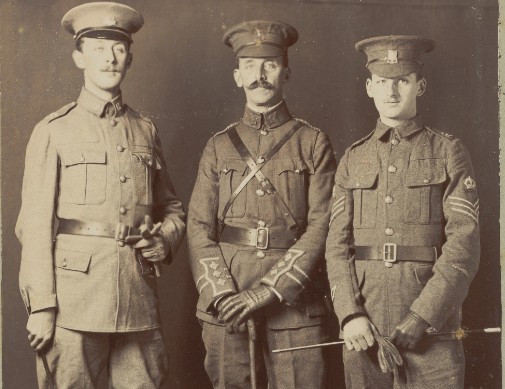Previously unseen poems by celebrated First World War poet published
Posted on 5 July 2023
 Canon Purvis (left) during his time in service
Canon Purvis (left) during his time in service
Purvis published under the name Philip Johnson, and throughout his lifetime never revealed the true identity of the writer behind such highly regarded works as High Wood and Chance Memory.
Although Purvis’ sister, Hilda, had revealed him as the celebrated poet after his death in 1968, the notebook containing handwritten poems, which was uncovered among an archive of Purvis’ personal documents donated to the University’s Borthwick Institute for Archives in 1991, helped confirm that Purvis lived his whole life masking the fact he was, in fact, the celebrated war poet known as 'Philip Johnstone'.
After the war he became a clergyman and archivist, and established the Borthwick Institute for Archives in 1953, now part of the University of York. Canon Purvis of York Minster’s poems are to be published as part of an anthology titled Versus and Fragments, Poems of the Great War to mark the Borthwick Institute’s 70th anniversary celebrations.
Mystery
It is unclear why Purvis decided to keep his identity secret, although his sister, who revealed his identity in a letter to the author and journalist Ernest Raymond in 1969, shared the belief that the poems were sent without his knowledge to the media by his friend, a Quaker doctor, serving with the Red Cross.
It has also been suggested that mystery of his identity prevailed due to the experiences Purvis had during the war. Purvis spent several months at the Front, before being injured during an attack on High Wood. He returned again in 1918, surviving the war, but suffering the effects of shellshock, as well as trauma as a result of the death of his brother whilst in service in 1917.
Purvis also risked his life to take pictures documenting his experiences during the war, something he might have faced a court martial for had he been discovered. Despite this, he became the author responsible for some of the most haunting and treasured poems of the Great War.
Remarkable find
Gary Brannan, Keeper of Archives and Research Collections at the University of York, said: “High Wood and Chance Memory are both hugely well-regarded works, and appear on school syllabuses, but in Purvis's lifetime he didn't own up to writing them. Purvis is as well-regarded as people like Siegfried Sassoon and Wilfred Owen when it comes to war poetry, but it's only recently that the rest of his poems have surfaced.
“It is truly remarkable that, a century later, we will see the publication of a whole new anthology by a Great War poet - one who ended up founding the Borthwick.”
The frontispiece of Purvis’ notebook bears the title: Verses and Fragments: Written at Cambridge, Cranleigh and in France. Each poem in the notebook is dated: the first, entitled ‘On the Cheviots: August’, was written in September 1912, and the last, entitled ‘In Memoriam: Fragments’, was written in July 1917. These poems of the Great War were written at Cambridge, where Purvis took a degree in History, at Cranleigh, where he was a school teacher, and in France, where he served on the Western Front.
Ordained
‘Chance Memory’, which hauntingly describes remembering the summertime beauty of the countryside in Sussex, while preparing to launch an assault on enemy trenches, was published in The Daily News on 23 June 1916, under the name ‘Philip Johnson’; and ‘High Wood’, which foresees tourists visiting the killing fields of the Battle of the Somme after the conflict's end, was published in The Nation on 16 February 1918 under the name ‘Philip Johnston’.
Both poems are in the Verses and Fragments notebook, and they are written in Purvis’s hand. He penned them while serving as a young officer in the 5th Battalion, Yorkshire Regiment. Apart from these two pieces of work, all of the poems in Purvis’s notebook are to be published for the first time in his real name.
After the war, Purvis, who was born in Bridlington in 1890 and educated at Cambridge, went on to teach classics before being ordained. He served as vicar of Old Malton in the 1940s, moving to St Sampson with Holy Trinity in York in 1947.
Borthwick
He later became a Canon at York Minster and the first director of the Borthwick Institute of Historical Research in York from 1953 to 1963.
Gary said: “We know the experiences of war affected him greatly; being part of an attack - going over the top - at High Wood in September 1916, was likely profound enough, but we know he was also deeply affected by the death of his younger brother George in action in 1917.
“He finishes writing High Wood just before he hears of his brother’s death, and the latest papers given to us include the telegram and letter sent to Purvis’s mother informing them of George’s death.
“Purvis was clearly an incredibly talented, brave, and complex person, and we are so very proud to be connected with him through the archives and honoured to be able to give him the poetry volume he never had during his lifetime.”
The poems found in the notebook have been transcribed and edited by Sue Mendus, emeritus Professor of political philosophy at the University of York, with support from the Sheldon Memorial Trust.
Explore more news

Report calls for urgent action to boost children’s mental health support through schools
Friday 26 April 2024

Climate change set to take over as key driver of biodiversity loss by 2050, experts warn
Thursday 25 April 2024

Conservation actions are effective at halting and reversing biodiversity loss, study reveals
Thursday 25 April 2024

More than a quarter of people with Covid infection develop Long Covid, new research reveals
Thursday 25 April 2024
.jpg)
University of York awarded £1.1 million to lead the first stage of UK’s first comprehensive study on devolution and social security
Thursday 25 April 2024
